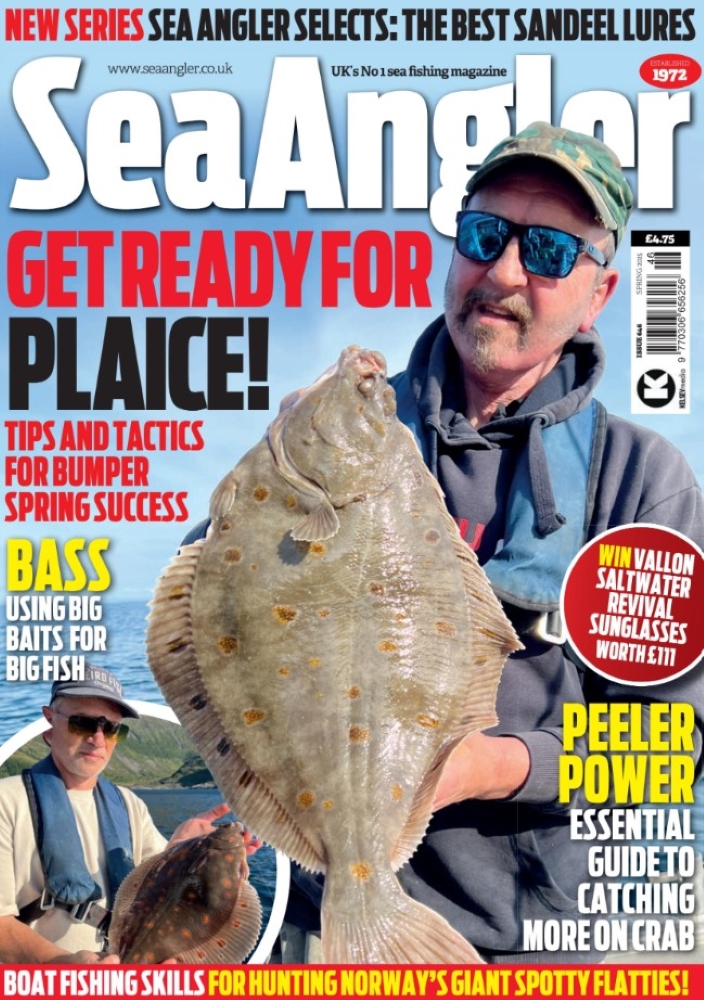SHORE MATCH FISHING: THE TACTICS, STRATEGIES AND PSYCHOLOGY BEHIND HOW TO WIN
A well-known character in our local angling fraternity went by the name of Dai Namic. This wasn’t his real name but one we gave him due to his very intense nature. Although he was an acknowledged, distinctive loner, he was a kind and compassionate soul who meant no harm to any of his fellow fishing club members. Despite this, we all hated him with a real passion. Why? Because, without exception, he won every single competition we held during the entire year – every year! A fanatical, uncompromising, zealot, he approached his fishing in the same way as he did every other aspect of his life – with total dedication and incomparable attention to detail.
Albert Einstein once said, “The person who follows the crowd will usually go no further than the crowd. The person who walks alone is likely to find himself in places no one has ever seen before”. Dai truly believed that winners carve their own paths, whereas following the crowd was for the insecure, that a winner’s mind-set is essential to succeed, to be a winner, you must think like a winner and think outside the box.
It’s hard to beat a person who never gives up. Dai was utterly convinced that to win, mind-set is everything and going to the extremes was second nature to Dai who had made winning a part of his habitual day-to-day practices. True winners, like Dai, take their learning to the next level; they don’t just seek out knowledge and absorb it, they chew it up and examine it thoroughly. Usually set aside and often unaddressed, mental preparation is the most important and crucial factor in fishing success. Do not allow the fear of failure to prevent you from showing up at a competition; this is a much more common occurrence than you think it is. Embrace it as an opportunity to go beyond your perceived personal talents and strengths.
Competitive fishing is a broad-gauged pursuit that requires not only mental preparation but also effective technical, material and logistical foundation, not to mention a high degree of physical fitness. Preparing for a fishing competition is a multifaceted process that requires strategic thinking, adaptability and attention to detail, not least of which is to develop a solid game plan and to fully understand the specific rules and regulations relating to each individual competition. These rules will include boundaries of the competition area, restrictions on fishing methods and equipment, times and procedure for the weigh-in, and, most importantly, the eligible fish species and their size limits. Do your research – check the weather and tides and look for contemporary catch reports to see which local baits and which areas of the competition venue are more likely to produce fish.
TOP TIPS ON HOW TO SUCCEED AT COMPETITION FISHING

PREPARATION IS EVERYTHING
Begin your preparation by gaining as much information as possible regarding the competition’s venue. Identify structures and features that might hold fish. It was Dai’s practice to pre-attend all upcoming venues and take photographs of the ground on which he was going to cast his bait. His did this at different states of an appropriate tide and studied the photographs comprehensively.
ARRIVE EARLY
Get to the venue with plenty of time to spare. It is important not to wait until the last minute, thereby avoiding unnecessary stress and pressure. Review your game plan in accordance with the current conditions and any last-minute information and adapt accordingly. If fishing a roving match, move to a new spot should you feel dissatisfied or have any reservations at all with your fishing spot.
SPEND ON BAIT
Spend as much time and money that you can afford in obtaining the best bait available. Bait is your most important commodity. You need fresh bait, lots of it, and a variety too since this will increase your chances of catching more fish than any other factor.
HAVE A PLAN B
Develop effective but common-sense backup plans for various scenarios. For instance, how you would adapt if there were significant changes in weather conditions, or what will you do if your optimal fishing spot is already occupied or the peg you’ve drawn out of the prime catching zone? What alternative techniques will you employ if your favoured strategy isn’t productive?
TACKLE CHOICE
Pay close attention to your tackle which should consist of an appropriate selection of individual components. Choose rods, reels, lines, and baits that are appropriate for the specific venue, environmental conditions, and, most importantly, the species you intend targeting. Pre-inspect all rods and reels for damage, re-spool reels with fresh line, use new hooks and lures. Organize your tackle box for easy access avoiding unnecessary clutter due to overloading. It is good practice to have a spare reel available. Have at least one rig ready to go in case you have a crack-off during casting or an irretrievable snag. This will be maximising the time your bait is in the water.
TACTICS
Consider the best tactics to adopt if you are fishing a competition for heaviest single fish of any species, heaviest bag (or both), or the heaviest fish of a specified species. It is always easier to target a mixed bag first before concentrating on catching the heaviest single fish.
STAY FOCUSED
Avoid the common mistake of losing focus during a competition. Dai seemed able to envelop himself in his own bubble whilst competing, cutting himself off from the world and his fellow competitors to concentrate fully. You must be prepared at all times to make quick decisions, adapt under pressure, and stay focussed on your game plan and overall strategy. Keep visualizing the positive outcome of winning the first prize.
REBAIT REGULARLY
Keep a close eye on the time your bait has been in the water. Reel in regularly: if there’s nothing left on your hooks all your other preparation is a total waste of time. Always load your hooks with fresh bait to increase the scent trail.
WINNERS NEVER QUIT
Don’t get disheartened if you fail to catch any fish. The one aspect of fishing that we all quickly learn in our fishing experience is that fish are often caught unexpectedly and sometimes in multiple numbers all at once. Surprise and anticipation are the essence and attractions of fishing. Quitting and making excuses is never an option for winners. There are lessons to be learned in failure, no lessons to be learned in quitting. Making excuses is for the weak. Dai never looked for excuses when he believed he had not come up to expectations.
WATCH THOSE AROUND YOU
Keep a close eye on those fishing around you to see whether any of them are succeeding in catching fish. Observe closely what tactics and bait they are using and don’t be afraid to ask. Most anglers are only too willing to help their fellow fishing participants, even under competition conditions. Ensure that you pay as much attention as possible to the productive competitors. Even the slightest detail can be crucial. This is best exemplified by an incident in which I was involved several years ago while fishing on an estuary sandbank during a flounder completion. I had some twenty anglers on either side of me. To my astonishment, I caught at least two and frequently three flounder with every cast of my three-hook paternoster, heavily loaded with harbour rag. Most of my fellow competitors who were, in the main, failing to catch any fish became more and more frustrated and bewildered at my success rate. As the competition progressed, many of them came closer to observe and to ask what I was doing in relation to tactics and bait so that they could emulate my catch-rate. Many of them mirrored what I was doing by using the same combination of coloured beads, spoons, snood lengths, long-shanked hooks, bait and casting distance. But this was mostly to no avail since only one or two managed to increase their catch-rates. They had all missed one critical detail which went unnoticed. I held my fishing rod at all times and my retrieve rate although positive was extremely slow, so slow that nobody was aware that I was retrieving my trace. I could feel the flounder hitting the bait time after time as I torturously retrieved, all the more so the closer it got to the bank. I firmly believe that this one pivotal, critical detail had made all the difference between success and lost opportunities.
BE A PROBLEM SOLVER
The very best competition anglers are the true all-rounders. They have learnt to develop ideas as new problems arise. Successful anglers find solutions to problems. Competition winners are solutions focused. Anyone can find problems, but winners can solve them, they shine their brightest when times are most challenging. You will often see good competitive anglers trying something outlandish, unexpected or bizarre when fish are refusing to bite and very often succeed in finding the fish. Make a note of the tactics and ideas you see them using and remember them for future use and use them as a basis for developing your own competition-related solutions.
SHOW RESPECT
Studies have shown that showing respect during sporting events make competitions much more enjoyable and satisfying for participants. In the context of a fishing competition this can best be achieved by: Respecting those fishing next to you, there’s nothing more frustrating for an angler than having their line pulled back to dry land by the person fishing alongside, particularly when they have just cast their fresh bait in the water; Respecting the environment, I have lost count of the times I have witnessed anglers leaving discarded rubbish at a fishing mark in their haste and eagerness to get to the weigh-in; Respecting the welfare of the fish you catch by returning as many as you can, as soon as possible; Respecting others who ask you to share your fishing experience and any advice or feedback you may have following the competition. This can be amongst the most enjoyable experiences involved with fishing.
FEEDBACK
Always attend the weigh-in even if you were unfortunate enough not catch any qualifying fish yourself. You will then learn what species of fish were caught, at what state of the tide, by whom and, more importantly, at what location at the venue and the bait used. Feedback is invaluable for true winners; not only do they receive it but they also embrace it. This separates the fishing champions from the also-rans, they always want to learn the truth even if it discloses their failings. Only then can they learn how to improve their performance the next time.
There is no doubt that Dai Namic was successful at competition fishing because he applied himself totally to his goals, nothing else took higher priority. He seemed to think so much about every detail but there was one aspect to which Dai Namic’s attention to detail did not extend – and that involved the regular polishing of his silver fishing trophies. The problem was he had so many of them.







